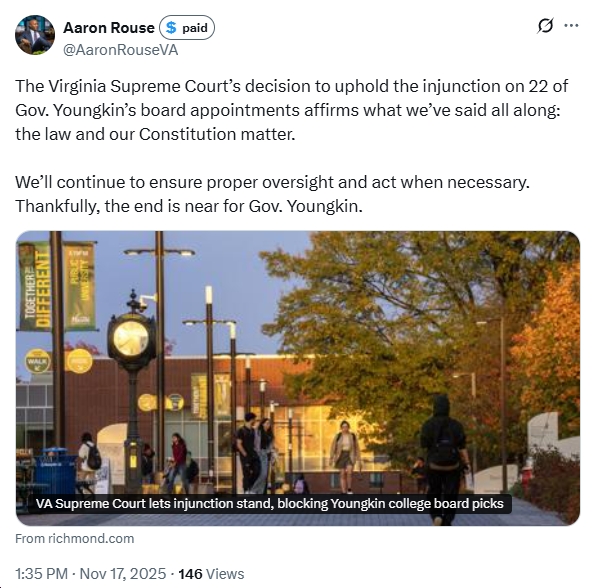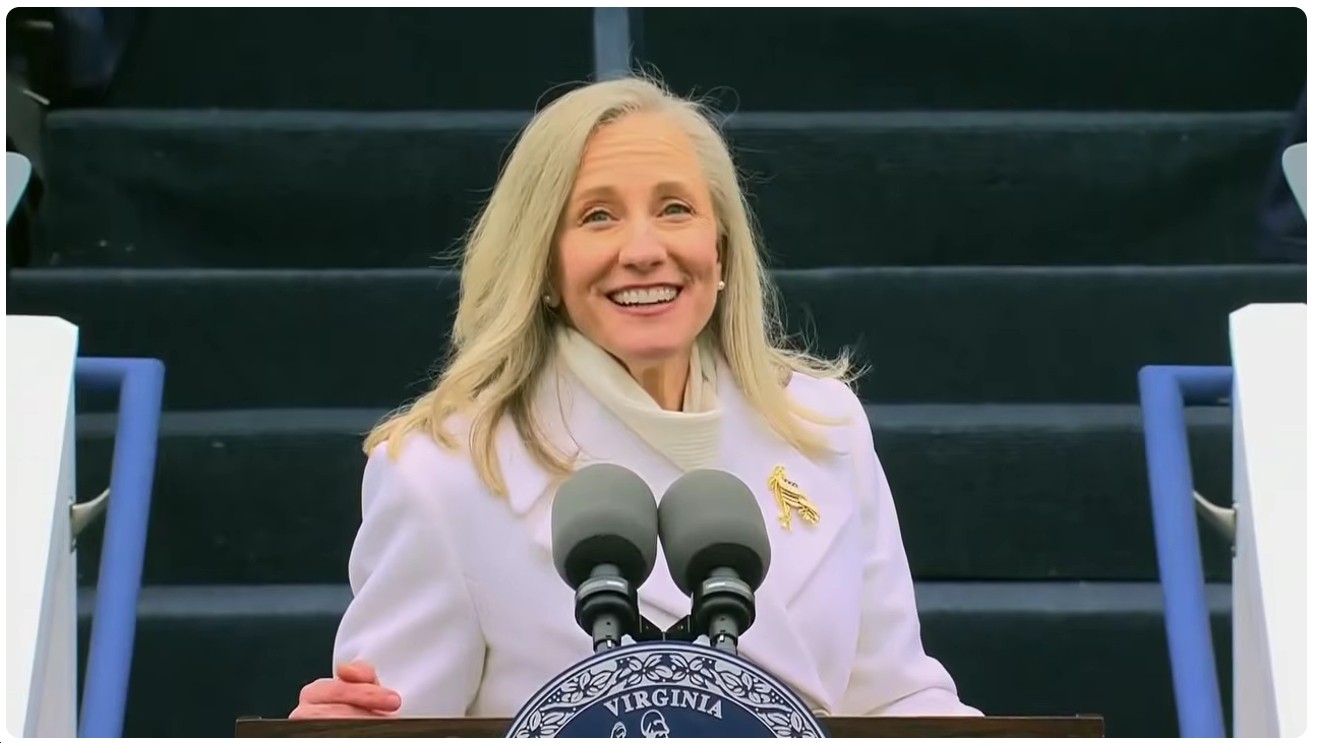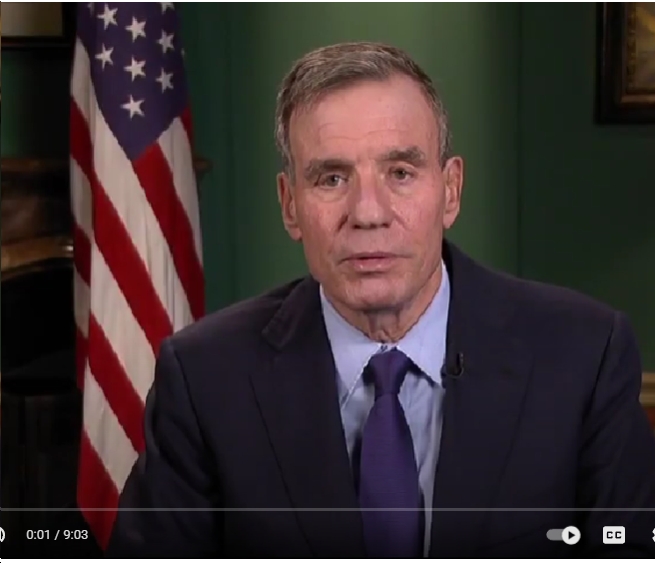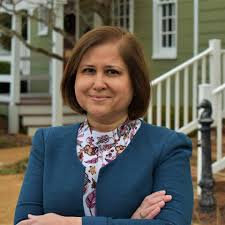Wow, very cool!
.@VP is on board and we’re wheels up to @_HamptonU as part of National HBCU Week to discuss the importance of STEM education. pic.twitter.com/6AMYeZBxx7
— Vincent Evans (@VinceEvans46) September 10, 2021
Before she arrived @_HamptonU, @RepElaineLuria & @DonnieTuck greeted her @NewportAirport @WAVY_News https://t.co/VigbfZKrVL
— Brett Hall (@BrettHNews) September 10, 2021
👋🏾…hey Hampton University. #HBCUWeek pic.twitter.com/Fi9qg9LHhH
— Vincent Evans (@VinceEvans46) September 10, 2021
They see her and know anything is possible. pic.twitter.com/IwV7eaIokY
— Vincent Evans (@VinceEvans46) September 10, 2021
“HBCU’s are not only competing, but they are also leading,” –@KamalaHarris says during a round table with STEM @_HamptonU @WAVY_News pic.twitter.com/Fj3Rlc6UWQ
— Brett Hall (@BrettHNews) September 10, 2021
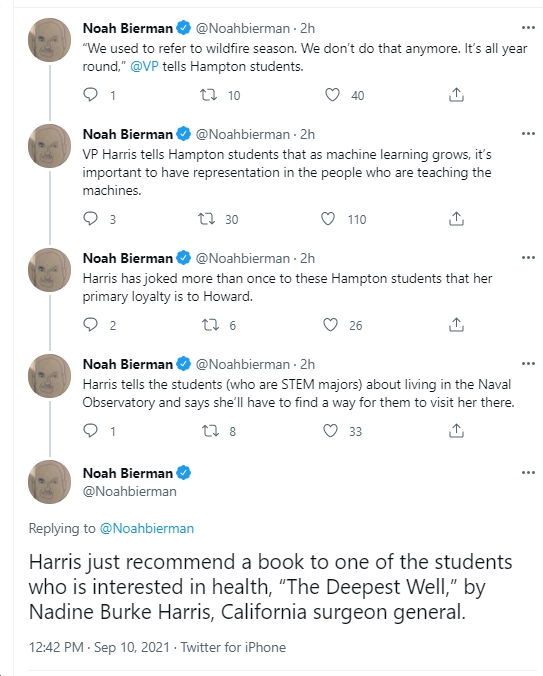
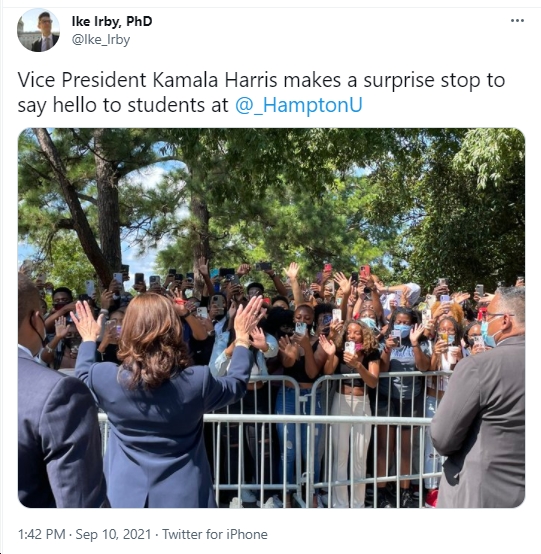
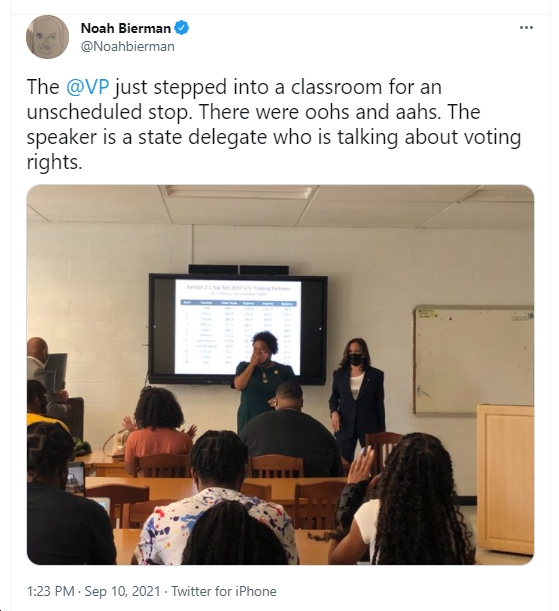
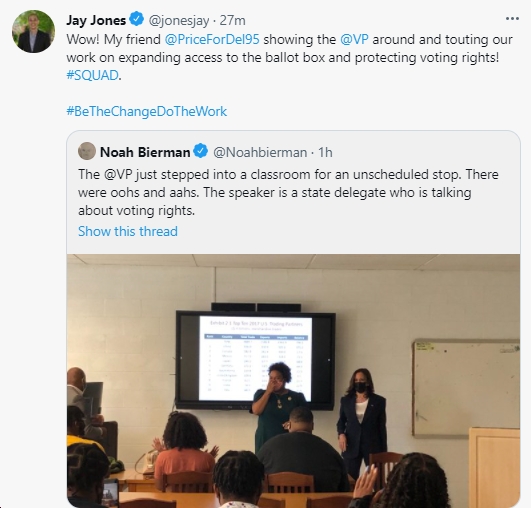
“Oh my goodness — I think this was my freshman bio class!” – Brittany Carmon, having a homecoming moment at @_HamptonU in our staff hold room https://t.co/8kA52jvEhr pic.twitter.com/DaS4SJ9NXT
— Peter Velz Archived (@PeterVelz46) September 10, 2021
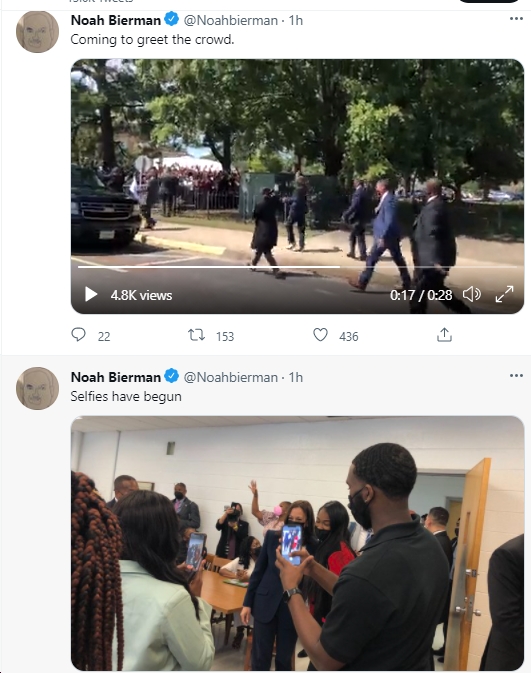
Enjoyed my time touring @_HamptonU with @VP in honor of National #HBCUWeek pic.twitter.com/bYML8nc9c0
— Elaine Luria (@ElaineLuria) September 10, 2021
https://twitter.com/SymoneSanders46/status/1436386310445481989
The @VP thanks her Hampton advance team before 🛫 to DC pic.twitter.com/ddZ9qJ5vrj
— Peter Velz Archived (@PeterVelz46) September 10, 2021
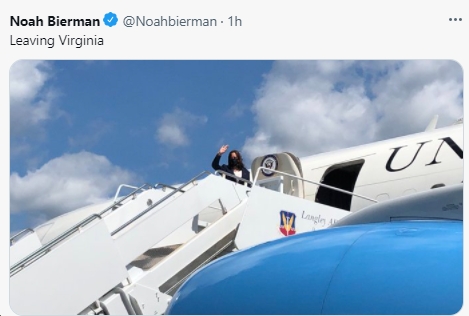
DURING CLASSROOM VISIT
TO DISCUSS VOTING RIGHTSHampton University
Hampton, Virginia
THE VICE PRESIDENT: Well, hello. You know, I was over in the other area of campus to meet with some of the extraordinary fellow classmates of yours who are studying STEM, and I wanted to just come by — obviously, a surprise visit — to talk with you all real quickly about voting, as the State Delegate said.
Professor, thank you for allowing us to interrupt, briefly, your class. Marketing, right?
STUDENT: Yes.
STUDENT: Yes, ma’am.
THE VICE PRESIDENT: And let me add — I’ll just tell you, quickly, because I didn’t realize that this is what you’d be doing at this moment. (Laughter.)
But my last trip, as your Vice President, was actually just a couple — a week and a half ago to Southeast Asia. I went to Singapore and Vietnam. And a big part of the trip was exactly what you all are studying, but in particular, around the issue of supply chains and also the relationship between the United States and all of our neighbors and partners around the world.
And what you all are studying right now is so critically important. I’m sure the professor has been covering it. You all have lived through this pandemic in a way that when you come out of school — and your role in leadership is going to be informed by the realities of the importance of what you’re learning right now, because the importance of what you’re learning right now is about the interconnection, the interdependence that has increased exponentially as these few years have gone by.
And you all are going to come out of school and leapfrog over the people who have been doing this for this whole time, because you have lived what it means to be a part of a global community. Think about what we now know in terms of global health: that if somebody is sick around the world, how that can impact your neighbor next door. Right?
How we are realizing — on the issue of the climate crisis — that the greenhouse gas emissions, in a place you’ve never been, can impact the quality of the air in the neighborhood in which you (inaudible). Right?
So what you’re learning right now is really about the interconnection in a way that is not only about national security, public health, but also about the economy of our country.
So, I’m so excited about your leadership. And that’s part of why I wanted to come by, to tell you what you already know as an HBCU student: You are a part of a strong and important legacy of leadership in our country. And to be an HBCU student is a point of pride and distinction. And you stand on the shoulders of people who dreamed that you all would be in this classroom right now taking on the role of leadership you are taking on.
So, I know now you’re trying to push through and stay awake in class, and it’s kind of warm outside. (Laughter.) And I (inaudible) what it feels like right now, but I’m telling you, you’re looking at yourself years later and you’re going to reflect on this moment knowing that you are sitting next to people who will be your lifelong friends. You will be godparent to their children. You will run into them in places you never believed you’d travel, just seeing them on the sidewalk. What you’re doing right now is going to lead to all of that, including your role — your rightful role as leaders in our nation.
So, specifically then, we came by to visit to quickly talk about voting, because that’s also about your role in leadership right now.
In 2020, young voters made the difference in that election. I would not have been elected the first Black woman to be a President or Vice President of the United States were it not for the turnout of young leaders like you. In fact, here at Hampton, incredible leadership by every sector of the student community, including the athletes who were very public about it. You all did that. It’s your power.
And so we have around this country right now — in Texas, in Georgia — any of you from Texas or Georgia? Right? You know what I’m talking about. Extraordinary attacks on our right to vote.
And I know you all learned and you know about the blood that was shed by John Lewis and so many others on the Edmund Pettus Bridge. You know about the sacrifices that were made.
But I want you to think about it in an additional way.
When you all turned out the way you did in 2020, that’s when we passed the Child Tax Credit, which is going to lift half of America’s children out of poverty. That’s when this administration put billions of dollars into HBCUs. That’s when we started to say that people should get compensation when they’re out of work for a pandemic not of their choosing, and $1,400 checks.
You all said that’s what you wanted, and that’s what you (inaudible) happening. You showed your power. And you know what happens sometimes when you show your power? It scares people, and then they might want to take your power from you. They might want to take your power from you.
And when people saw what you all did after that — we saw what was happening in Texas and Georgia and all those other things — do not ever let anybody take your power from you. Do not ever let anybody take your power from you. And know your power in your heart and your soul and in your brain.
And part of your power is your power to vote. It really does make a difference.
So I wanted to come by to say that because you’ve got a lot coming up, but this is something we cannot let slip through our hands. And it’s under vicious attack right now; it’s around our country.
I’m working on passing the John Lewis Voting Rights Act and what we need to do — the For the People Act — to make sure that we push back against these bans on early voting. Any of you vote early or you got relatives who vote early? People who are working two and three jobs — they need time. Not everybody can vote on Election Day and take time off or have paid leave, right?
Vote by mail. The people we know may be your aunts and uncles and your parents who’ve got three kids in the backseat who don’t have time to stand in line with those three kids, but can drive through and drop their ballot off in the drop box, right?
These are the measures that have put in place been put in place to make it easier for people to vote. And there are states around our country that are trying to make it harder for people to vote because they’re scared when you vote.
Because when you vote, things change. And when you vote, we win.
So, I just wanted to come, Professor, to just make that point, to emphasize that point that you already know. You are extraordinary leaders right now. I cannot wait to see what you will do next.
And thank you, Professor, for allowing me to interrupt your daily business. You’re really fantastic. Because I’m telling you — look at these (inaudible). This is — this is telling us something about the role that each country plays and our role in the context of the world.
END
|
|

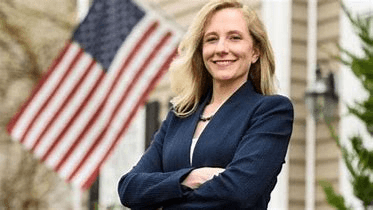
![Virginia NAACP: “This latest witch hunt [by the Trump administration] against [GMU] President Washington is a blatant attempt to intimidate those who champion diversity.”](https://bluevirginia.us/wp-content/uploads/2025/07/gmuwwashington.jpg)
